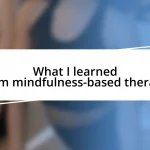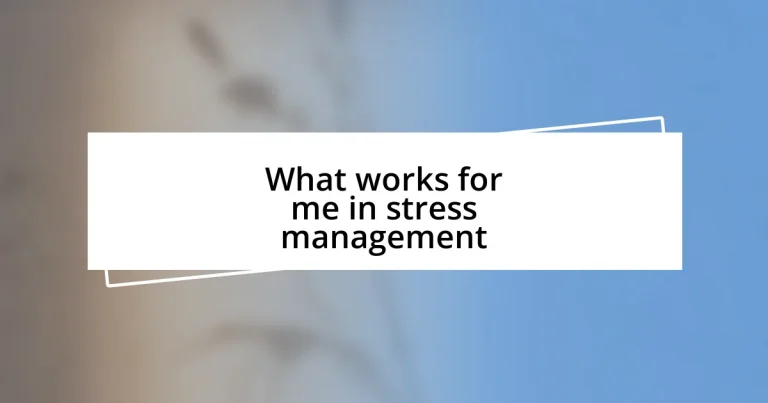Key takeaways:
- Effective stress management techniques include deep breathing, journaling, and physical activity, each offering unique benefits for mental well-being.
- Identifying personal stress triggers, such as work deadlines and social situations, aids in developing coping strategies and fosters better self-care.
- Building a support network and participating in community groups can provide emotional relief and enhance feelings of belonging, essential for managing stress effectively.
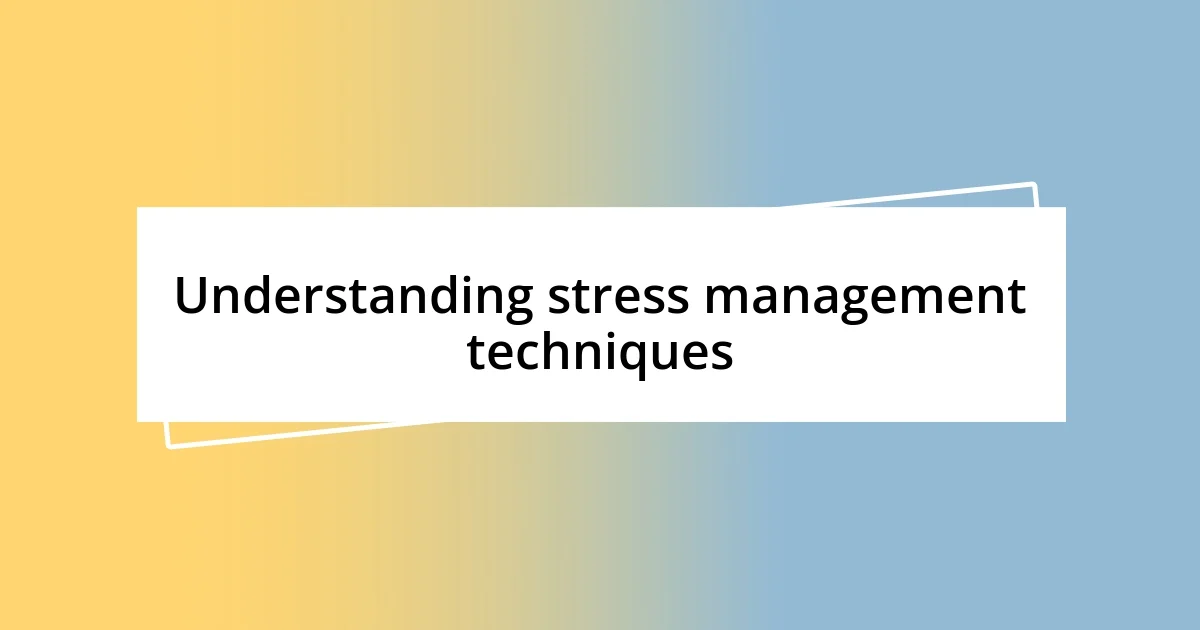
Understanding stress management techniques
Stress management techniques come in various forms, and understanding which ones resonate with you is crucial. For example, I remember the first time I tried deep breathing exercises. At first, I felt silly taking those slow breaths, but soon enough, I was surprised by how quickly they transformed my state of mind. Have you ever noticed how just a few deep breaths can shift your focus?
Another method I’ve found effective is journaling. Writing about my thoughts and feelings not only helps me process my emotions but often reveals patterns I didn’t notice before. Have you ever felt like you were just going through the motions? Journaling can prompt those reflections, making it a powerful tool in managing stress.
Then there’s physical activity, which is such an invigorating way to combat stress. I can’t tell you how many times a brisk walk or a good workout has lifted my spirits. Do you ever find yourself overwhelmed and think, “I just need to move”? It’s amazing how just changing your environment or getting your heart rate up can refresh your perspective.
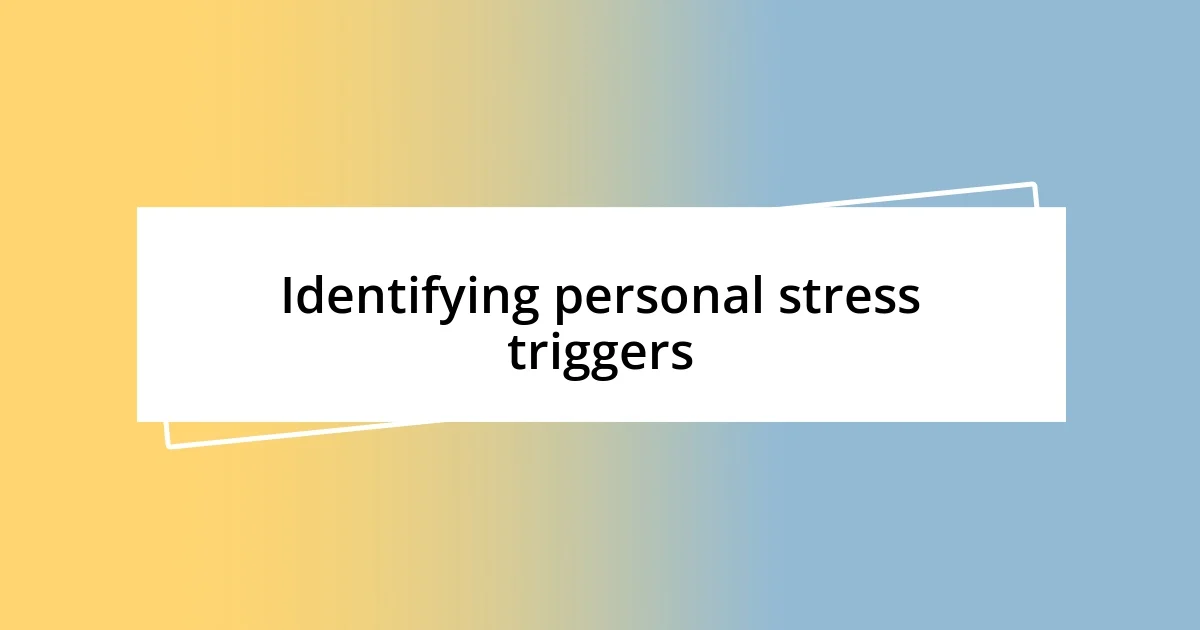
Identifying personal stress triggers
Identifying personal stress triggers is an essential step in managing stress effectively. For instance, I’ve come to realize that certain work deadlines often make my heart race. It took me a while to connect those dots, but once I did, I found strategies to cope more effectively. Have you noticed patterns in your own stress responses?
Some stressors can be quite sneaky. Recently, I discovered that social situations, particularly large gatherings, drained my energy more than I expected. I remember feeling completely overwhelmed after a friend’s wedding, despite feeling excited beforehand. Understanding these triggers has helped me make better choices about social engagements moving forward.
It’s also worth mentioning that life changes, like moving to a new city or starting a new job, can be significant stressors. I once moved to a bustling urban area, and although I loved the adventure, it took me a while to recognize how much the change was affecting my mood. By acknowledging this trigger, I learned to incorporate self-care during those adjustment periods.
| Trigger Type | Example |
|---|---|
| Work-Related | Impending deadlines |
| Social Situations | Large gatherings |
| Life Changes | Moving to a new city |
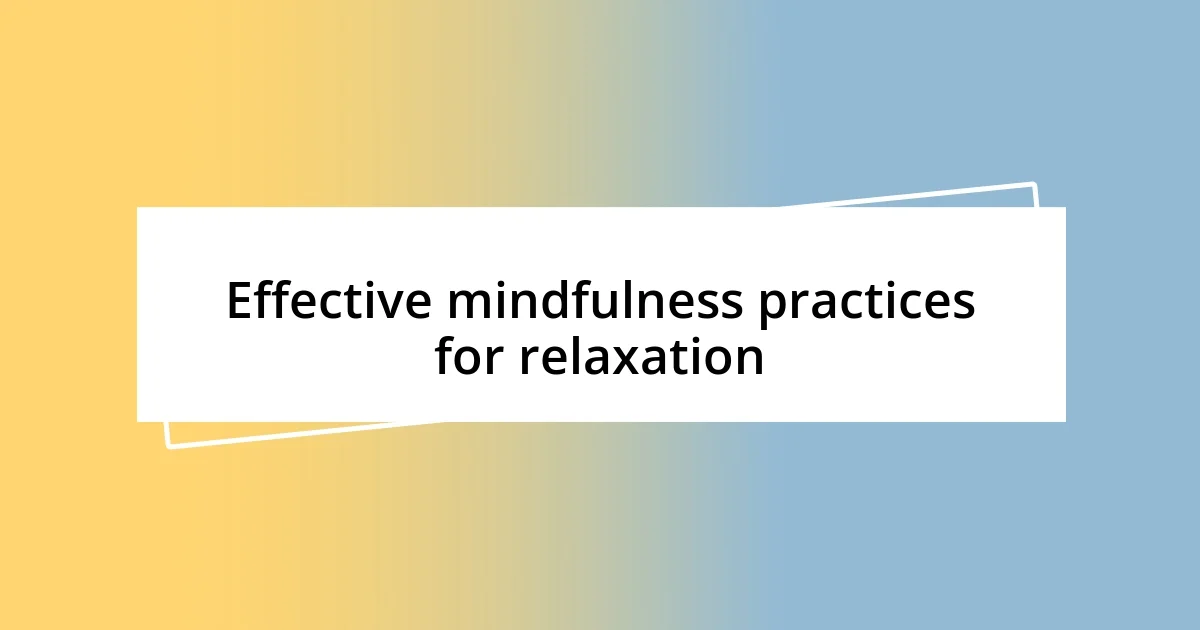
Effective mindfulness practices for relaxation
Mindfulness practices have been game-changers for my relaxation routine. One standout experience for me was when I discovered guided imagery. I vividly remember lying on my bed, headphones on, while a soothing voice led me to a tranquil beach. I could almost feel the sand between my toes. It’s incredible how such vivid mental imagery can transport you away from stress, even if only for a few minutes.
Another powerful method I enjoy is body scan meditation. In one particularly frantic week, I set aside ten minutes to consciously notice every part of my body. Starting at my toes and working my way up, I found tension I didn’t even know I was holding. With each exhalation, I released that tightness, and it felt as if a weight had been lifted.
Here are some effective mindfulness practices I recommend:
- Deep Breathing: Focus on your breath; inhale deeply and exhale slowly.
- Guided Imagery: Listen to recordings that lead you through calming visualizations.
- Body Scan Meditation: Mentally scan your body for tension and consciously relax each muscle.
- Mindful Walking: Take a slow walk, paying attention to each step and your surroundings.
- Gratitude Journaling: Write down three things you are grateful for each day, grounding yourself in positive reflections.
Incorporating these practices into my daily life has made relaxation feel not just attainable, but a vital resource in managing stress. I believe they can help you reconnect with yourself too.
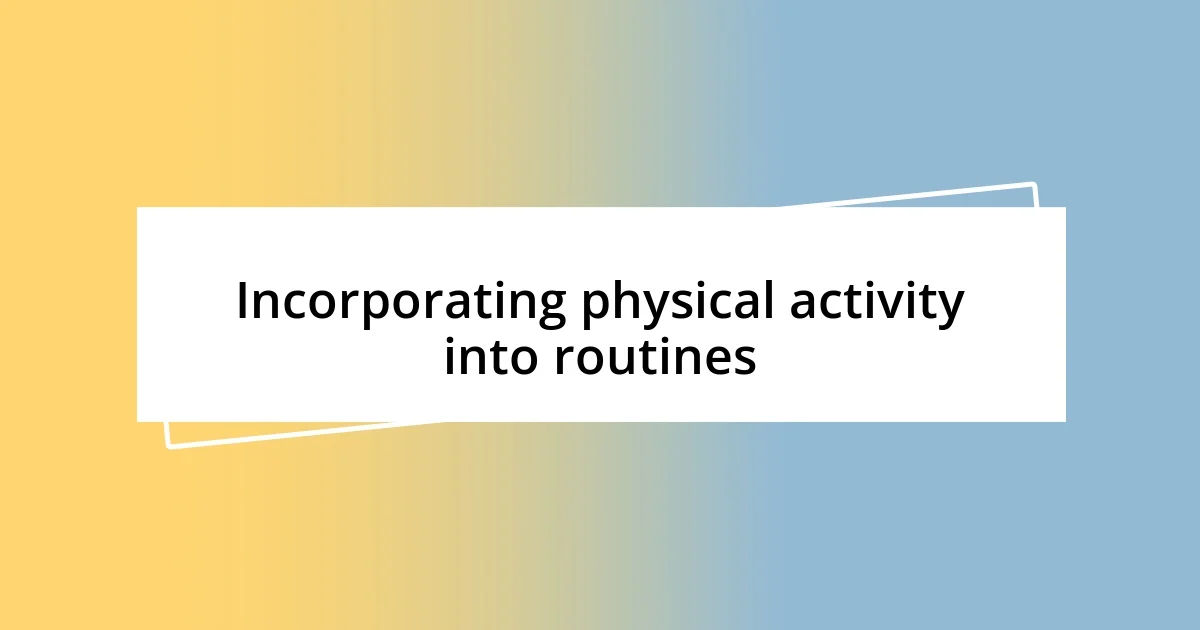
Incorporating physical activity into routines
Integrating physical activity into my daily routine has been a revelation for managing stress. I still remember the first time I went for a brisk walk during a particularly overwhelming week. As I stepped outside and filled my lungs with fresh air, I felt a wave of calm wash over me. It’s fascinating how something as simple as movement can shift your mood—have you noticed that too?
I’ve also experimented with different forms of exercise, discovering what truly resonates with me. For instance, dancing in my living room, fueled by my favorite playlist, lifts my spirits instantly. I can’t help but smile as I lose myself in the rhythm, forgetting my worries. It’s exhilarating! What activities energize you?
The beauty of physical activity is that it doesn’t have to be monotonous. Perhaps you could even try joining a local sports league or taking up a new class. I once joined a mixed-ability yoga group, which not only improved my flexibility but also fostered a sense of community. Those shared moments, punctuated by laughter and camaraderie, remind me that movement is often as much about connection as it is about personal health. Think about something new you might want to try!
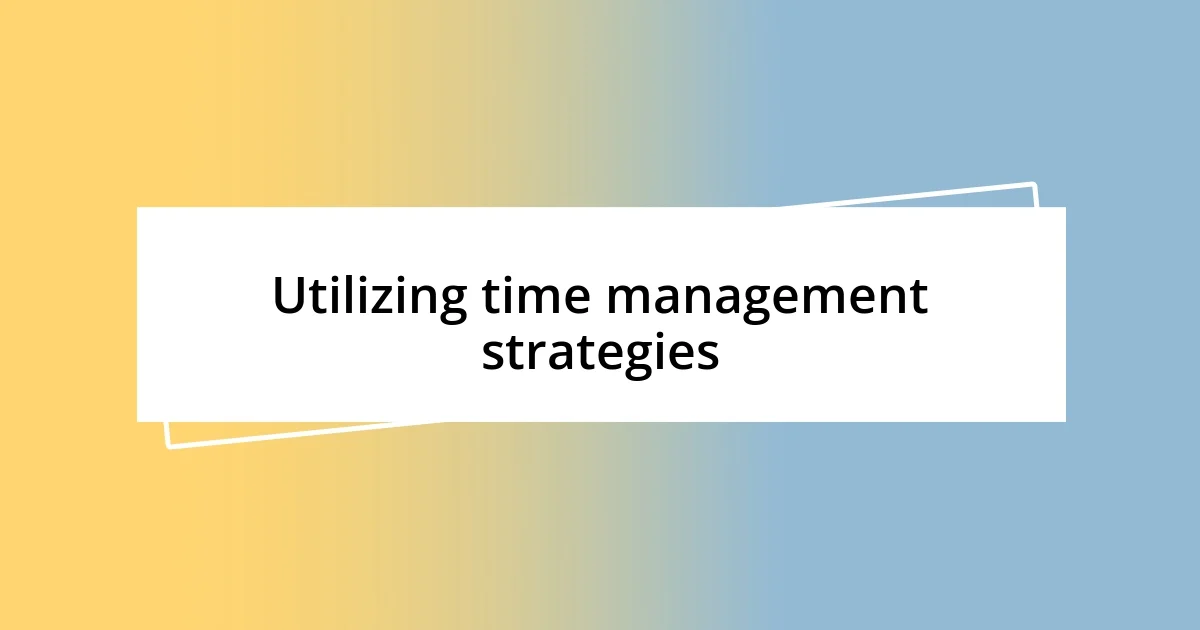
Utilizing time management strategies
Utilizing effective time management strategies has transformed how I approach stress. It reminds me of a time when my to-do list felt overwhelming, with tasks piling up like a mountain. I started breaking my tasks into smaller, manageable chunks, almost like carving away at that mountain until it became a series of little hills. Have you ever tried this? It was a game-changer for my motivation!
One tactic that I’ve found beneficial is the Pomodoro Technique, which involves working in focused bursts followed by short breaks. When I first implemented this method, I was a bit skeptical. But after just a couple of hours, I noticed my attention span improved. Using a timer not only kept me accountable but also made my work feel less daunting. I remember completing more in those focused 25-minute sessions than I did in an entire afternoon of distractions!
Moreover, I’ve emphasized prioritizing tasks using a simple yet effective method: the Eisenhower Matrix. By categorizing tasks into urgent and important, I’ve been able to focus on what truly matters. Reflecting on my past experiences, I recall feeling stressed out by tasks that weren’t even crucial. Figuring out what needed my attention first has given me clarity and relief. What higher-priority tasks might you be overlooking?
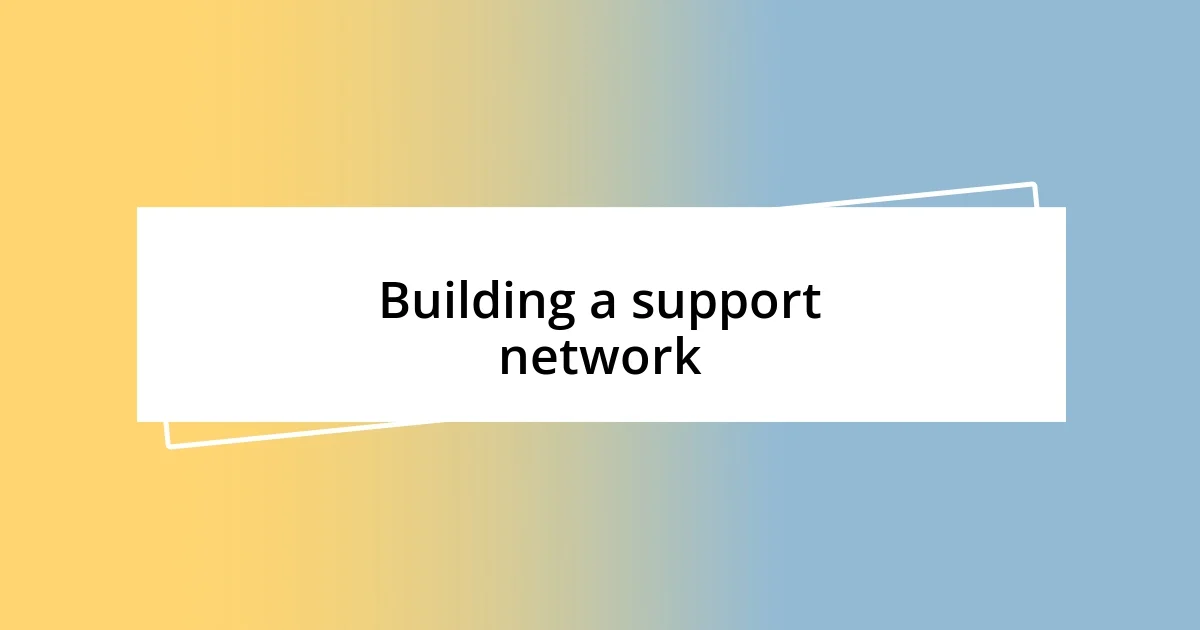
Building a support network
Building a support network has been an essential part of my stress management journey. I still vividly recall the sense of relief I felt the first time I reached out to friends during a particularly tough period. Just having someone to talk to made my problems feel lighter, like sharing the weight of a heavy backpack—have you experienced that kind of relief? It’s amazing how sharing our burdens can lead to greater emotional clarity.
I also learned the value of surrounding myself with positive, uplifting individuals. Some friends truly bring light to my life, encouraging me to embrace my authentic self and share my struggles without judgment. I remember attending a small gathering where everyone shared their personal stories, and it felt like a safe space for vulnerability. Those connections not only strengthened my friendships but also fostered a sense of belonging—don’t you think that community is vital in tough times?
Moreover, I’ve found that participating in local support groups can be incredibly rewarding. During a particularly stressful phase, I joined a community group focused on mindfulness practices. I was surprised at how quickly I formed bonds with others who were navigating similar challenges. It created a space for shared experiences, laughter, and growth—something I desperately needed. Consider what type of group or network might spark joy or encouragement in your life.





